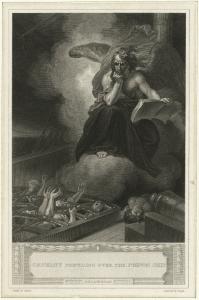After British forces attacked
Danbury, Connecticut, New Haven paper The
Connecticut Journal reported on April 30, 1777, “The enemy on this occasion
behaved with their usual barbarity, wantonly and cruelly murdering the wounded
prisoners who fell into their hands, and plundering the inhabitants, burning
and destroying every thing in their way.”
The British and Loyalist forces landed at what is now Westport on April 25, 1777. Royal Governor of New York Major General William Tryon commanded the force of about 2,000 men. Tryon’s object was the military depot at Danbury.
Americans spread the alarm upon sighting the British ships. The few Continental troops in Danbury evacuated the town but managed to secure parts of the town and the supplies there. As The Connecticut Journal reported, “The enemy on their arrival began burning and destroying the stores, houses, provisions, &c.”
Major General David Wooster, Brigadier General Gold. S. Silliman and Brigadier General Benedict Arnold raised about 700 men, both Continental soldiers and Connecticut militia, to challenge the invaders. Sadly, Brigadier General Wooster was mortally wounded in the fighting of April 27. Wooster died from his wounds a few days later, on May 2, 1777.
For more background on William Tryon and his advocacy of desolation warfare against the Americans, please consult the book by Historian Paul David Nelson, William Tryon and the Course of Empire: A Life in British Imperial Service (Chapel Hill: University of North Carolina Press, 2011 [1990]).
The British and Loyalist forces landed at what is now Westport on April 25, 1777. Royal Governor of New York Major General William Tryon commanded the force of about 2,000 men. Tryon’s object was the military depot at Danbury.
Americans spread the alarm upon sighting the British ships. The few Continental troops in Danbury evacuated the town but managed to secure parts of the town and the supplies there. As The Connecticut Journal reported, “The enemy on their arrival began burning and destroying the stores, houses, provisions, &c.”
Major General David Wooster, Brigadier General Gold. S. Silliman and Brigadier General Benedict Arnold raised about 700 men, both Continental soldiers and Connecticut militia, to challenge the invaders. Sadly, Brigadier General Wooster was mortally wounded in the fighting of April 27. Wooster died from his wounds a few days later, on May 2, 1777.
For more background on William Tryon and his advocacy of desolation warfare against the Americans, please consult the book by Historian Paul David Nelson, William Tryon and the Course of Empire: A Life in British Imperial Service (Chapel Hill: University of North Carolina Press, 2011 [1990]).
